The Old Broke Rancher Delivers His Book Report

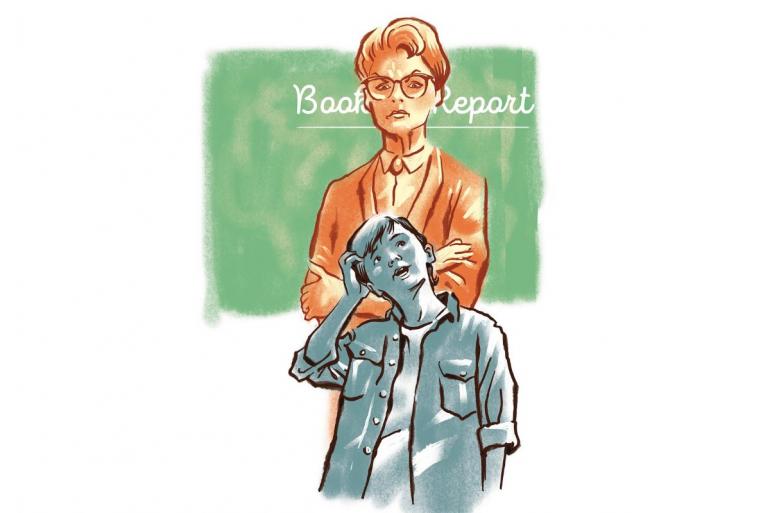
It's a feeling I've experienced many times since—standing before a boss, a teacher, or a wife utterly, woefully unprepared for whatever they've called on me to do.
Whatever task I've forgotten in the ill-fated hopes that it'll disappear if I only sublimate it reappears with a vengeance. It manifests like a fist in my stomach. Oh no, I think; you're in for it now, Gary. You've forgotten your anniversary, Aunt's birthday, or buddy's intervention.
The first time I can remember feeling that heady mixture of shame and terror was on a rainy late Spring day in fourth grade, when my teacher Mrs. Harvey announced that it was time for us to do our book reports.
Uh oh. Book reports?
I vaguely remember having been assigned something to read and talk about in front of the class. What was it? Mrs. Harvey told us that we would be going in the alphabetical order of our last names. I tried to think of everyone with a name after mine. Darrel Smith? Vivian Thomas? Little Bobby Weatherly? Good thing for me that most of the class were Andersons, Joneses, and Nelsons. That gave me time to remember the book and fabricate a convincingly vague description of what the book was probably about.
I fidgeted nervously through descriptions of Mr. Popper's Penguins and Sword in the Stone, Farmer Boy and The Story of Ferdinand, trying all the while to remember what I had been supposed to read. I could almost picture the cover of the thing from when I had glanced at it for about five seconds before tossing it under my bed and running outside to catch frogs or something. I seemed to remember a couple of red stripes, and it was a short title. Was there an image on the cover? The suggestion of a silhouette?
Still, I might have had an ace up my sleeve, I figured. There was no way in God's purple mountain majesty that the teacher had read every book on which we were supposed to report. To do such a thing would take years, maybe even decades. Twenty or so kids, and each book about 200 pages mean that for her to read them all, she'd have to plow through something like (I struggled to do the math, trying to definitively nail down the number of zeroes) 40,000 pages! I smiled. Now I knew I had her. No one could read that many pages.
In fact, I thought as little Paul Buckley told us what happened in something called Five Children & It, she probably hasn't read any of these books at all! If I were the teacher, I realized, I wouldn't have read any of these lousy books. I'd go home after school and shoot bottles off fence posts, or ride horses, or something fun. And if I were right about that, than I could probably just make up the plot of the book and old Mrs. Harvey would never be the wiser. How hard could it be to come up with a viable book plot? People seemed to do it all the time, judging by how many books there seemed to be—probably hundreds!
Thus buoyed by a sense of confidence in my skills as a confidence man, I sat through Caroline Sebring's narration of Tom Sawyer thinking I'd probably be able to pull off the book report with an A-, or at least a B, as long as I could remember which book it was I was supposed to report on. "Very good, Caroline. You've done a lovely job of summarizing the novel." Presently, consulting a sheet of our names, she turned to me. "Gary Shelton, you're next." "Yes, Thank you, Mr. Harvey. I appreciate the chance to talk on my book." After a pause, she nodded. "Right. Well, you're welcome. Go ahead. Tell us about National Velvet."
Yes, that's right! My mind raced as I tried to recall something, anything, about National Velvet. I seemed to vaguely recall there was a movie made out of it, but this was before streaming services and video stores. My only chance to have seen it would have been to catch it on television, but even though we had an old black and white set that weighed half a ton and which came in about as clear as if the image were projected on the side of a tornado. Even if it had been broadcast on TV, I wouldn't have seen it because if my Mom had caught me watching the TV rather than reading my bible or doing my chores, she'd have had me stretched on the rack. All of which is to say that I was up the literary creek, and no paddle to be found.
"Go ahead, Gary."
Ok, time to invent the Great American Novel.
"Uh. Ok. National Velvet is about a man." I looked into her eyes for any sign that I was right or wrong. I saw none. She stared back, waiting for the rest of the story. Maybe I was going to make it after all! "This man is named Horace, and he owns a velvet factory named National Velvet. He's the most important velvet making business man in the world, and he has a big mansion, and a big car. But..." I paused while I tried to think of an inciting incident for my exciting story, which was already better than most novels as far as I was concerned.
Mrs. Harvey nodded, absorbed.
"...but he got in an accident and lost his, uh, leg. And after that, he gets a letter from a long lost uncle in Romania that tells him that he's inherited a castle. In Scotland. But the uncle is in Romania. So Horace gets a fake leg and goes to Scotland. His last name is Velvet, too. I forgot to say that earlier. So Horace Velvet is in Scotland and he is living in this castle, uh, without his family, because he was tired of them so he left them behind. But then it turns out the castle is haunted." Mrs. Harvey nodded, obviously transported. "By the ghost of his brother, Horace's brother I mean, who was named Pete. Pete had died when he was shot down in a zeppelin while on a secret mission for the Pope, who was trying to recover some secret documents from a group of Zulu warriors, and now he spends his days trying to find his, uh, head again."
"My goodness," is all Mrs. Harvey said.
I continued. "So Horace agrees to help him find the head, only it was stolen by the Zulu Warriors, and it turns out the Pope's behind it all. In the end, Horace rediscovers how much he loves making velvet for America, so he goes back to his company, National Velvet, which is why the novel is called that."
For a moment, the room was quiet. The faces of my classmates were wide-eyed.
"Wonderful. I just have one question."
"Shoot," I said, overconfident.
"Who's the author of National Velvet?"
I was getting cocky now, knowing that all I had to do was say the first name that popped into my head and I'd get off scot-free.
"Corky Philburn," I answered, proud of the impromptu moniker, which to me sounded impossibly cosmopolitan.
Mrs. Harvey looked at me for a long time while the class was silent.
"Actually," I said, "it was, um, a man named Petey, uh, Garber... man...smith."
Her facade finally cracked at this, and she allowed herself a chuckle. Then she allowed herself a good long laugh her ass off guffaw. Some of the class also luxuriated in a hearty chortle.
When the ha-has had subsided, Mrs. Harvey made a note in her grade book. "I suggest you read the book sometime, Gary, you might find you like it. In the meantime, I'm afraid I have to give you an F."
"Yes, Mrs. Harvey," I said, slinking back into my seat.
To this day, I've never read National Velvet, but I did see the movie only to find it was just one of those girl-and-her-horse stories, with no papist plots or ghosts. It wasn't even really about national velvet, that was just the name of the girl, or the horse, I forget which. I hate to say it, but I still think my version is better. I'd say I deserved at least a D for originality.
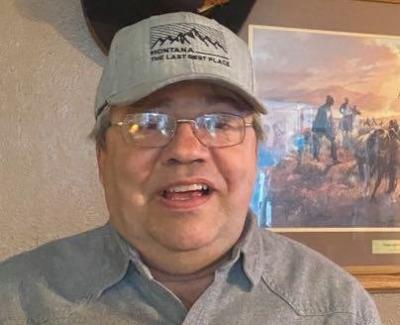
Gary Shelton was born in Lewistown in 1951 and has been a rancher, a railroader, a biker, a teacher, a hippie, and a cowboy. Now he's trying his hand at writing in the earnest hope that he'll make enough at it to make a downpayment on an RV. Hell, scratch that. Enough to buy the whole RV. He can be reached at [email protected] for complaints, criticisms, and recriminations. Compliments can be sent to the same place, but we request you don't send them - it'll make his head big.
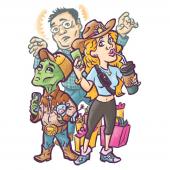

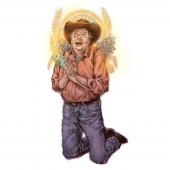
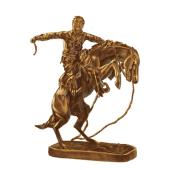
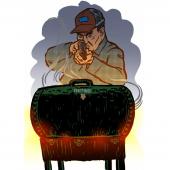

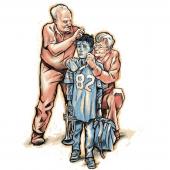

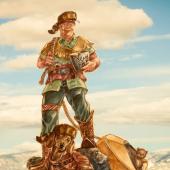
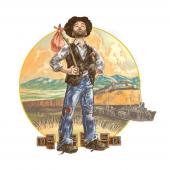
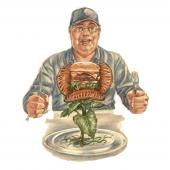
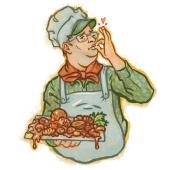
- Reply
Permalink